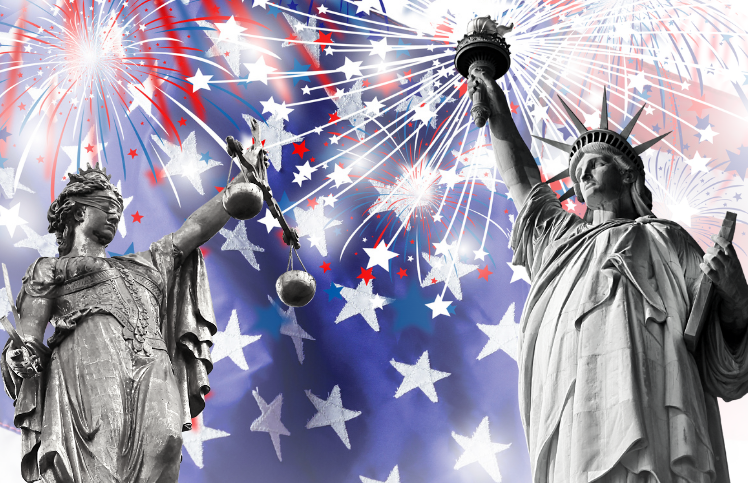by Gary Kaplan
What are we celebrating?
The Declaration of Independence is a curious document. Much of it consists of grievances against the actions of King George III which are summarized as “the establishment of an absolute Tyranny.” There are 27 discrete articles in the catalogue of complaints.
The themes are familiar: arbitrary governance and legislation; usurpation of justice and the rule of law; military occupation; economic imperialism in taxes and trade; overt military aggression and incitement of domestic insurrection. All tourists on the Freedom Trail and fans of the Boston Tea Party have heard these complaints recited since childhood.
One of the charges is seldom noticed:
He has endeavoured to prevent the population of these States… [by] obstructing the Laws for Naturalization of Foreigners; refusing to … encourage their migrations hither….
It is particularly resonant in light of our continuing discord over immigration that the King’s anti-immigration policy was an offence to the businessmen and lawyers who drafted the Declaration.
But the most audacious of all the statements in the Declaration is the one on which the legitimacy of these complaints rests:
We hold these truths to be self-evident, that all men are created equal, that they are endowed by their Creator with certain unalienable Rights, that among these are Life, Liberty and the pursuit of Happiness.—That to secure these rights, Governments are instituted among Men…
It the eighteenth century, it was hardly self-evident that all men are created equal. The civilized world was mapped into monarchies that ruled feudal societies stratified into rigid classes. Governments were instituted to enforce class distinctions and protect the privilege and property of the ruling classes. All men were created unequal and the monarchs used their armies to keep them that way.
Even in these self-proclaimed egalitarian colonies, all men did not mean all men. It did not include the 20% of the colonial population who were slaves. Nor did it consider women. But despite those large blind spots, the principle of equality was stated as the fundamental purpose of government and the basis of the case for independence. In 1776 that was a long stretch.
Two and a half centuries later, equality is an unchallenged value. Our civic discourse since the latter half of the 20th century has been driven largely by the idea of equality—economic, social, political, educational. In our field, education, almost the entire national discourse has concerned the search for equality.
Brown vs Board of Education in 1954 is a convenient reference date. With the rejection of the “separate but equal” subterfuge, the Supreme Court reinforced the primacy of equality as a fundamental American value. The history of American education since can be read as an ongoing struggle to approach that goal.
(By an amusing rhetorical coincidence, the phrase “separate and equal” occurs in the first paragraph of the Declaration as the station to which the separatists aspired.)
Two issues on our current front pages illustrate the persistence and expansion of the pursuit of equality. In Boston, the debate over exam school admissions has been going on for years. In the past year or two, the statewide issue of vocational school admissions has measured just as many column inches. These two different bands of the educational spectrum illustrate the converging expansion of the demand for equality.
All men are created equal. Today, no one questions that axiom. But neither can anyone believe for a moment that all men are equal in their life circumstances. Economic inequality has emerged as the dominant theme of the Democratic party. The question is how much, not whether, the Party can deliver legislation intended to reduce that inequality.
In education, access to exam schools and vocational schools will be made more equitable. Here too, the question is not whether, but how much and how fast.
Political independence was not an end in itself but the mechanism to achieve equality of life, liberty and the pursuit of happiness. An early draft said property. The drafters were aware of the distinction between opportunity and outcome. Equality of opportunity is theoretically attainable. Equality of property or happiness is not even conceivable.
As we approach July 4, it might be useful to reflect on the power of the concept of equality. It was the idea of equality that drove the colonists to demand independence. The power of that idea bound them together and drove them to pledge their lives, their fortunes and their sacred honor to each other. The pursuit of equality can be a unifying force in our fractured time. Perhaps we should rename this holiday in honor of the principle that drove the signers: Equality Day.
Gary Kaplan is executive director of JFYNetWorks.
Other posts authored by Gary can be found here.
HOW ARE WE DOING? In our pursuit to serve up content that matters to you, we ask that you take a couple of minutes to let us know how we’re doing? Please click here to be navigated to our JFYNet Satisfaction Survey. Thank you!





